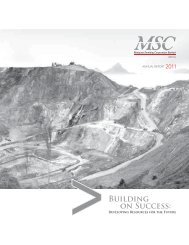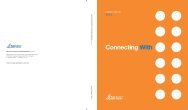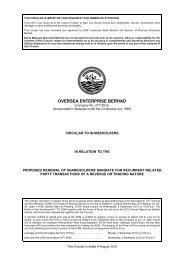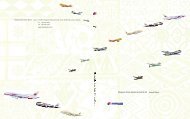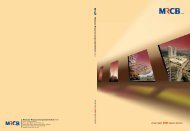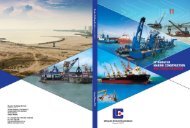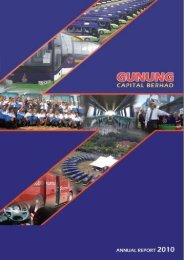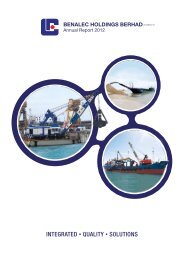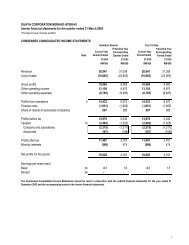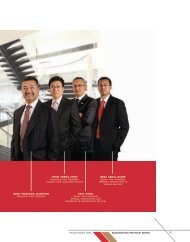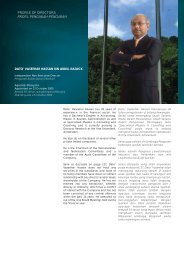Download PDF - ChartNexus
Download PDF - ChartNexus
Download PDF - ChartNexus
You also want an ePaper? Increase the reach of your titles
YUMPU automatically turns print PDFs into web optimized ePapers that Google loves.
annual report | 2012 Gunung Capital Berhad (330171-P)<br />
62<br />
NOTES TO THE FINANCIAL STATEMENTS (cont’d)<br />
31 DECEMBER 2012<br />
2 SIGNIFICANT ACCOUNTING POLICIES (cont’d)<br />
2.4 Summary of Significant Accounting Policies (cont’d)<br />
(r) Income Tax<br />
Tax on the profit or loss for the financial year comprises current and deferred tax. Income tax is recognised in<br />
the profit or loss except to the extent that it relates to items recognised outside profit or loss, either in other<br />
comprehensive income or directly in equity.<br />
Current tax expense is the expected tax payable on the taxable income for the financial year, using tax rates<br />
enacted or substantially enacted at the balance sheet date, and any adjustment to tax payable in respect of<br />
previous financial years.<br />
Deferred tax is provided, using the liability method, on all material temporary differences arising between<br />
tax bases of assets and liabilities and their carrying amounts in the financial statements.<br />
Temporary differences are not recognised for the initial recognition of assets or liabilities that at the time of<br />
the transaction affects neither accounting nor taxable profit. The amount of deferred tax provided is based<br />
on the expected manner of realisation or settlement of the carrying amounts of assets and liabilities, using<br />
tax rates enacted or substantially enacted at the balance sheet date.<br />
Deferred tax assets are recognised for all deductible temporary differences, carry forward of unused tax credits<br />
and unused tax losses, to the extent that it is probable that future taxable profits will be available against<br />
which these assets can be utilised.<br />
The carrying amount of deferred tax assets is reviewed at each reporting period and reduced to the extent<br />
that it is no longer probable that sufficient taxable profit will be available to allow all or part of the deferred<br />
tax asset to be utilised. Unrecognised deferred tax assets are reassessed at each reporting period and are<br />
recognised to the extent that it has become probable that future taxable profit will allow the deferred tax<br />
assets to be utilised.<br />
Deferred tax relating to items recognised outside profit or loss is recognised outside profit or loss. Deferred tax<br />
items are recognised in correlation to the underlying transaction either in other comprehensive income or directly<br />
in equity and deferred tax arising from a business combination is adjusted against goodwill on acquisition.<br />
Deferred tax assets and deferred tax liabilities are offset, if a legally enforceable right exists to set off current<br />
tax assets against current tax liabilities and the deferred taxes relate to the same taxable entity and the same<br />
taxation authority.<br />
(s) Employee Benefits<br />
(i) Short term benefits<br />
Wages, salaries, bonuses and social security contributions are recognised as an expense in the year<br />
in which the associated services are rendered by employees of the Group and of the Company. Short<br />
term accumulating compensated absences such as paid annual leave are recognised when services are<br />
rendered by employees that increase their entitlement to future compensated absences, and short term<br />
non-accumulating compensated absences such as sick leave are recognised when the absences occur.<br />
(ii) Defined contribution plans<br />
As required by law, companies in Malaysia make contributions to the state pension scheme, the Employees<br />
Provident Fund (“EPF”). Such contributions are recognised as expense in profit or loss in the year to<br />
which they relate.



